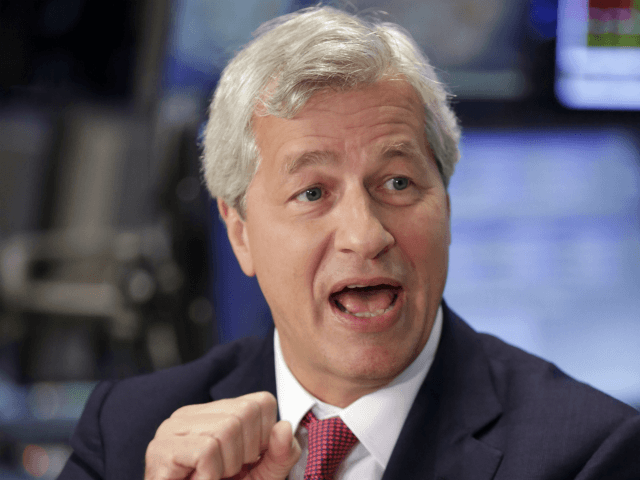J.P. Morgan Chase chief Jamie Dimon on Wednesday rejected in the strongest terms the idea that the country’s largest banks should stop funding new oil and gas production and exploration.
The chief executive of the largest U.S. bank was testifying before a House panel with other bank executives. Representative Rashida Tlaib, the Michigan Democrat, claimed that preventing temperatures from rising more than 2.7 degrees in the coming decades would require no new fossil fuel production.
“Please answer, yes or no. Does your bank have a policy against funding new oil and gas products?” Tlaib asked.
“Absolutely not and that would be the road to Hell for America,” said Dimon.
Tlaib responded by saying that every J.P. Morgan Chase customer who benefits from the Biden administration’s student loan relief program should close their account. Earlier in the hearing, Dimon had criticized the Biden administration’s program, calling it “badly done.”
Gasoline prices hit a record high this year as oil soared. U.S. oil production has lagged because of underinvestment in the sector, in part driven by the popularity of ESG funds that shun fossil fuels. Climate change activists have sought to pressure banks and others to avoid investing in oil, gas, and coal production regardless of the costs to the U.S. economy.
Russia’s invasion of Ukraine has spotlighted the dangers of Europe’s lack of energy security. Because Europe has underinvested in fossil fuel energy infrastructure at the behest of so-called climate change pressure groups, it is perilously dependent on Russia for natural gas. Soaring energy prices in Europe a likely to push economies there into a deep recession and have prompted the U.K.’s new conservative government to enact an enormous spending program aimed at keeping household energy bills in check.
🚨 Rep. @RashidaTlaib asked all major bank CEOs to submit to her ESG agenda and stop funding fossil fuels.
Their response?
JPMorgan Chase CEO Jamie Dimon: "Absolutely not and that would be the road to Hell for America." pic.twitter.com/rGX7EjrVZj
— Consumers' Research (@ConsumersFirst) September 21, 2022
Jane Fraser, the chief executive of Citigroup, also said her bank would not stop funding fossil fuels.
“We will continue to invest in and support clients who are investing in fossil fuels and in helping them transition to cleaner energy,” Fraser said.
Brian Moynihan, chief of Bank of America, took a less combative tone in response to Tlaib’s question.
“We are helping our clients make a transition. And that means we are lending to both oil and gas companies and to new energy companies,” he said. “We’re helping monitor their course toward the standard you are talking about.”
Wells Fargo’s CEO said he agreed with Moynihan.
Before Tlaib ended her line of questions, she again attacking Dimon, telling him “you obviously do not care about working-class people.”
Tlaib ended her questions by threatening banks with regulations requiring them to stop funding fossil fuels.
“If your financial institutions are not going to follow through on your net zero commitments, then regulators—including the Federal Reserve and Congress—must step in and make them,” Tlaib said.
The Biden administration has recently elevated Yue (Nina) Chen to serve as chief climate risk officer for the Office of the Comptroller of the Currency, one of the primary regulators of banks in the U.S. She is thought to support the kind of regulations Tlaib mentioned.

COMMENTS
Please let us know if you're having issues with commenting.